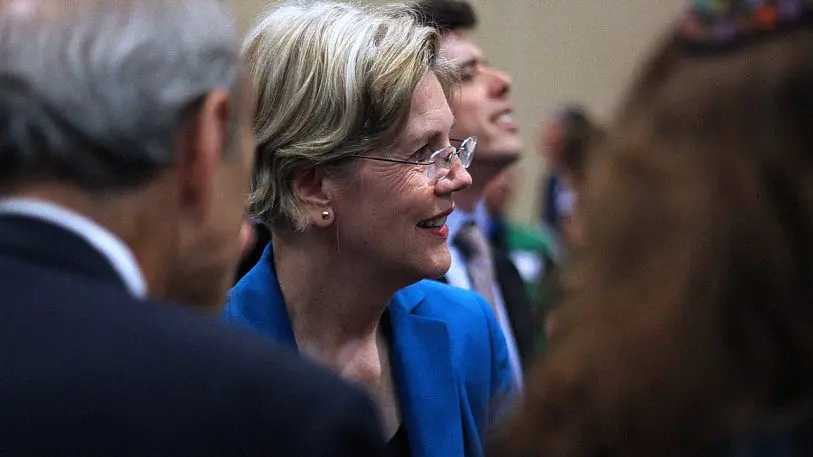The largest companies in the U.S., from Amazon to Wells Fargo to Walmart, impact the lives of millions of people across the U.S. Amazon, for instance, employees over 560,000 people; Wells Fargo reaches 70 million customers. These corporations sit in the middle of a massive web of stakeholders, from workers to managers to customers to executives to shareholders. And yet, only those last two–executives and people who own stock in the company–have any substantive say in how these businesses are actually run.
This explains some of the most pernicious trends in America, particularly widening inequality. Determined to appease shareholders, companies have shortchanged worker salaries at the expense of driving up stock prices. And CEOs have reaped the benefits, pulling in take-home pay that continues to rise, in large part due to hefty stock options for executives that make up around 62% of their compensation. In 2017, for instance, CEO compensation grew around 17.6%–to an average of $18.9 million–while pay for regular workers, adjusted for inflation, actually declined by .2%.
“Shareholder primacy,” as this model is called, creates an insular feedback loop among the extremely wealthy around how a business is run, and whom it benefits. Given that just 10% of the U.S. population owns 84% of the stock market, that same slice of the economic upper crust has an outsized say on matters that affect the lives of everyday Americans like salaries and benefits. Regular workers, on the other hand, are watching their salaries fall and basic necessities creep out of reach but have little recourse to stop the process.

With a new bill she introduced last week, Senator Elizabeth Warren is proposing a way to amend this imbalance that is, according to Lenore Palladino, senior economist and policy counsel at the Roosevelt Institute, “both radical and simple.”
Warren’s bill, called the Accountable Capitalism Act, would mandate a fundamental restructuring of those large companies so that their business decisions favor and account for not just executives and shareholders, but the whole range of stakeholders that support them. If companies, as current courts have ruled, are to be treated like people, Warren wants to ensure, via her bill, that they conduct themselves like ethical members of society. In doing so, the Accountable Capitalism Act could precipitate the shift of trillions of dollars in wealth from the top 10% to the struggling middle and lower classes, without requiring any federal spending.
The bill would require corporations with more than $1 billion in annual revenue to get a new federal corporate charter (currently, all businesses are chartered by the states). The charter would require corporate directors to consider the interests of all major corporate stakeholders–like workers, their communities, in addition to stockholders–in company decisions. Shareholders could sue if they believed directors weren’t fulfilling those obligations, and companies would be protected from shareholder lawsuits claiming the companies were violating a fiduciary obligation to increase stock prices at all costs.
The bill would also give workers a stronger voice in how they’re represented, by putting them on corporate boards. Currently, workers (unless they’re also shareholders) have no say in either who serves on the board or the decisions it makes, but Warren’s legislation would allow them to directly elect at least 40% of directors (so if there were five directors on a board, two of them would be selected by workers). This, Palladino says, “gives democratic choice to people who want to be on the board.” Warren’s bill doesn’t set rules on who could fill those seats–it could be a union representative, or a current or former employee. The employees themselves, depending on their circumstances, can elect representatives who they feel will be best able to represent their needs and interests on the board. Employee representation on corporate boards is not only a widespread practice in other countries like Germany, it’s also politically popular in the U.S.: Recently, a poll found that well over half of voters supported adding workers’ voices to company decision-making.
But beyond diversifying the makeup of corporate boards, large corporations will also have to ensure that their business practices represent the needs of the broader stakeholder community–an approach, Warren writes in the Wall Street Journal, that reflects the benefit corporation model, in which companies opt into a “stakeholder governance” approach that holds them accountable to goals, like environmental sustainability and community impact, that extend far beyond appeasing shareholders.
Companies like Patagonia currently represent the stakeholder governance model done right, Palladino says, but the idea actually represents a reversion to the way businesses used to interact with the greater public–which explains why Warren’s bill is both radical, but not that new of a concept. “The original idea of corporations was that with the privileges granted to them by law and by the public came social responsibilities,” Palladino says. “For nearly 100 years, corporations operated to make profit and to produce quality products, but with a balanced sense of social purpose.” Up until the 1980s, for instance, wages grew at a rate that was commensurate with corporate productivity, and workers at a corporation could expect to earn a livable salary that would increase over time.
But that changed, Palladino says, under the Reagan administration. Building off the ideas of conservative economist Milton Friedman, who argued throughout the 1970s that businesses’ sole obligation lay in maximizing shareholder returns, the Reagan administration introduced a set of rules in 1982 to prioritize shareholders. Around that time, companies were sending less than half of their earnings to shareholders; between 2007 and 2016, that proportion grew to 93%. It takes only a rudimentary understanding of math to understand how this shift has resulted in the wage stagnation for ordinary workers over the past several decades.
Because Warren’s bill wants to reverse the way companies have been run for the past several decades, there’s been some pushback, mostly from the right. Harvard University economics professor Jeffrey Miron told CNBC that imposing new regulations on large companies would only give them more opportunities to evade the law and create “a recipe for more crony capitalism.” He also cautioned that companies put off by the legislation may choose to incorporate in other countries (but failed to mention they’d likely have to avoid Europe, where 19 countries currently have similar regulations in place). Black Entertainment Television founder Robert Johnson, the first black billionaire in the U.S., added that he believed the legislation was useless because well-run companies, from his perspective, already take into account varied stakeholder needs. “I think it’s a solution in search of a problem that’s absolutely not necessary,” he told CNBC. National Review correspondent Kevin Williamson spoke out against the legislation, apparently under the belief that Warren was proposing to put all industry under the direct purview of the federal government, not just put under a regulatory framework that exists in many other countries in the world, to seemingly no ill effect.
Given the makeup of the government, the bill is obviously just a conversation starter for now. But what would happen if it became law? For one thing, share prices for companies valued at over $1 billion would fall. According to Vox, “for the vast majority of people who earn the majority of their income by working for wages, cheaper stock would be offset by higher pay and more rights at work”–something many working Americans have too long gone without. Vox also adds that “for billionaires with huge stock holdings–and for CEOs with compensation packages tied to share price performance–it would be a disaster.” They would see a portion of their wealth transferred away to people who have not seen a meaningful raise since the 1980s.
As to whether Warren’s legislation stands a chance of passing, Palladino is optimistic. Warren is not alone in proposing pieces of legislation “that really take on the structural issues of corporate power with an eye toward rebalancing power in our economy,” she says; senators Tammy Baldwin, Cory Booker, and Chuck Schumer have all floated legislation that proposes limits on stock buybacks and recommends worker representation on corporate boards.
Ultimately, Palladino says, the amount of momentum around equity-creating legislation like Warren’s testifies to the fact that the current shareholder primacy model is not practical for ensuring the long-term health of a company. When the workers who support it are not paid enough to be able to live comfortably outside of work–or, as is happening in places like the Bay Area, they’re not able to afford to live in proximity to the company–it creates worker turnover and unrest that ultimately strains a company’s bottom line. Studies on stakeholder governance and worker representation on corporate boards in Germany, on the other hand, found benefits not only in terms of greater pay equity for workers, but an increase in productivity and innovation across companies, and Democratic legislators are beginning to look to that as a model. “The party as a whole is . . . looking for smart, commonsense solutions that would allow us to have an economy that works better for more people,” Palladino says.
Recognize your brand’s excellence by applying to this year’s Brands That Matter Awards before the early-rate deadline, May 3.
